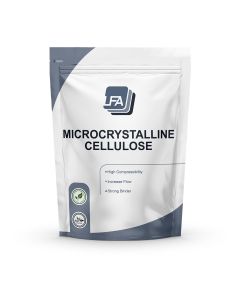Microcrystalline Cellulose
Microcrystalline-cellulose, often referred to as MCC is refined wood pulp produced in a controlled environment. It’s a white powder that doesn’t have any taste or smell.
MCC is an inert substance, meaning it’s chemically inactive and will not react with other ingredients, it’s commonly used as a bulking agent, binder, glidant, disintegrant and an auxiliary suspending agent. It is considered to be one of the most versatile excipients.
MCC is great excipient for both tablet production and capsule production.
The main advantages of microcrystalline-cellulose are that
- MCC has excellent compressibility properties will increase the compressibility of your formulation.
- Microcrystalline Cellulose helps with flow allowing formulations to move smoothly through machinery ensuring consistent table weights.
- MCC is an excellent binder to help your tablets stay together avoiding fragile tablets.
- It’s also used as a filler which is needed when the doses of your active are very low.
- As well as being odourless, tasteless and non-reactive, MCC also has a low bulk density which will lead to higher dilution and packing density
Microcrystalline Cellulose is the most common binding agent used to manufacture solid dose foods and pharmaceuticals. This is due to its compatibility and strength when turned in to a tablet whilst also dissolving easily when digested.
It also acts great as a bulking agent if you need to increase the weight of your tablet a little more.
It’s used as a disintegrant in formulations and speeds up the formed tablets deterioration allowing your active to work faster.
MCC is directly compressible meaning it can be pressed into a tablet directly without any other ingredient, a huge benefit to this is that it does not have to be granulated which makes the tableting processed more streamlined and efficient.
MCC is safe to consume in normal quantities and is widely used as an excipient for its all around versatility.

